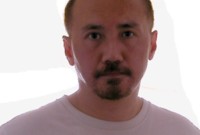Remembering Tianamen - alternative review of Beijing Coma
 Beijing Coma by Ma Jian
Beijing Coma by Ma Jian
My review
From the first page on, life literally flashes by the protagonist. He is told: ‘This is a clear sign that now on you’re going to have to take life seriously.’
Dai Wei, a Beijing University student, has been shot in the head in the 1989 Tiananmen Square Massacre. The story proper begins as the narrator switches to Dai Wei, now in a coma.
We journey with Wei, from his birth, childhood and adulthood, to finality. We see him falling for his childhood love Lulu, who later betrays him; a Hongkongese A-Mei, who breaks his heart, is killed in Tiananmen Square and might have come back as a sparrow in his last days; and then Tian Yi, who escaped death and to the US. We read how he and his friends in Southern University in Guangzhou devour foreign literature, like Kafka’s, and ideas, like Freud’s. We follow him to Beijing University where he studies biology, and which is where he gets involved in student protests for government reforms. We experience his sensations while he lies in a coma, being cleaned and fed through a tube by a despairing mother, who even if she exhorts him to die soon still attempts to find him healers. Interspersed within Wei’s narrative is some rather clinical observation of his medical condition.
Life has never been easy for Wei, even at birth, when he fell out from his mother, into a ‘cold concrete floor’, his head splitting with pain. This is like a foretelling of his fate, of being shot in the head.
When he was a teenager, the police, interrogating him about a banned book he copied out and gave to Lulu, threatened him with boiling water from a flask. They told him: ‘If we don’t teach you a lesson now, you’ll end up with a bullet in your head.’ These words never took as he got shot later as an adult.
All that cannot compare to other horrors and turpitudes of a country’s regime. During the period of the one-child policy, birth control officers carried out forced abortions at family planning clinics, throwing foetuses into buckets, strangling new babies.
One kind of horror which traumatizes Wei was experienced by his father in internment camp: cannibalism. His father might have been eaten himself if he wasn’t moved out to Shandung. A doctor he talks to in Wuxuan, researching such atrocities, also adds that local citizens proved their loyalty to the Party by executing friends and neighbours. Wei learns that ‘revolution’ in Chinese characters is written as ‘elimination of life’.
Wei himself experiences cannibalization of a sort when his mother had to sell off one of his kidneys to fund his medical upkeep. Wei gives us a blow by blow account of how the doctors remove his kidney - without anaesthetics. The descriptions wouldn’t look amiss among cut-and-kill scenarios in American Psycho.
The reader can expect similar minute details throughout the entire novel, especially in the Tiananmen Square pages. Wei likens the scenes in the Square to some movie set. However the dialogue is not so much akin to a film as sometimes it can be a little stilted and formal. But, surprisingly, this works here, because the reader could be watching a Chinese opera, particularly one set on an immense stage with stage directions and asides aplenty, with a preponderance of characters. At best the writing can sometimes read like late 80’s New Journalism investigative articles you find in Rolling Stone and Esquire magazines.
However there are some moments of lyricism when, in love, Wei sees Tian Yi as a ‘celestial fairy about to take flight’. That aside, one of the most poignant passages can be found in a visit from Tian Yi when she touches comatose Wei’s foot, sending him into an almost erotic paroxysm.
Nearing the book’s end, things are looking bleak for Wei and his mother, who refuses to sign the demolition agreement to her house and receive a pittance of a compensation. She is slowly driven to insanity as she is persecuted for being a member of the Falun Gong; her electricity, water and phone cut off. Her neighborhood is being razed to the ground for a new shopping complex, whose chairman is none other than Lulu. Their house is the only one standing, bulldozed and rammed, just like Wei’s friends were by the Chinese army in Tiananmen Square. Nearing the end, Wei is now finally starting to see light behind his eye lids, when before, his entire Weltanschauung while in a coma has been through his ears and nose.
At the close of the book the reader encounters a déjà vu. Without disclosing the dénouement, suffice it to say, the reader may view this as Gestalt parallelism, yin yang, or karma - no matter which, all very similar and universal.
Also, Wei is finally told: ‘But once you’ve climbed out of this fleshy tomb, where is there left for you to go?’ Where indeed? If you believe in karma, when one does not have anywhere left to go, there is no cycles left to endure, one has reached the apex (just like Wei finally seeing himself in a public square with just one building standing, atop in an iron bed) – Nirvana.
View all my reviews.





















